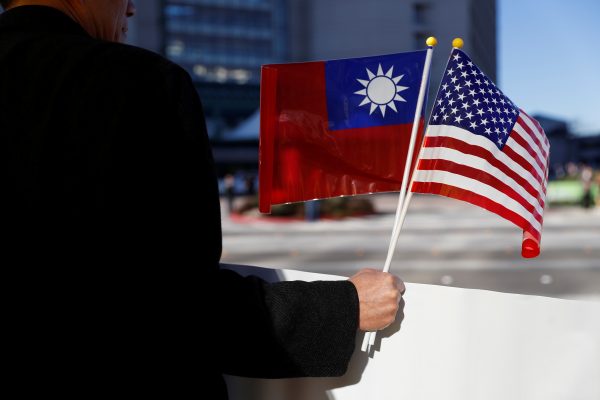The last few years of fighting for diplomatic recognition have been difficult for the ‘Republic of China’ (ROC, Taiwan). In 2013, Gambia cut diplomatic ties with the ROC, formalising relations with China by March 2016. In 2014, the former president of Guatemala admitted to accepting US$2.5 million in bribes in exchange for continued diplomatic recognition of Taiwan. This form of chequebook diplomacy was supposedly ended under former Taiwanese president Ma Ying-jeou. More recently, in December 2016, the African nation of Sao Tome and Principe severed formal relations with the ROC in favor of establishing diplomatic ties with China.
As Dennis Hickey has previously argued, such visits fulfil three purposes. First, they serve as a reminder that a ‘better than nothing’ number of states recognise the sovereign status of the ROC. Second, these meetings appeal to Taipei’s few remaining diplomatic allies to present Taiwanese perspectives in international organisations. Third, and most importantly, they provide a strategic opportunity for transiting through major cities in the United States. Approval for US stopovers must come from Washington, and such visits are a big source of contention from Beijing. The Chinese foreign ministry claimed that allowing Tsai to transit through the United States would send ‘the wrong signal to Taiwanese independence forces’.
Moreover, where the Taiwanese president is allowed to stopover is often a signal of Washington’s approval of Taipei’s management of cross-Strait relations. In 2006, Chen Shui-bian was denied transiting through San Francisco, New York or Houston by the Bush administration, and was instead given a limited refuelling stop in Alaska.
When Tsai’s second Latin American tour was announced, reports surfaced that she would transit through New York in an effort to meet US President Donald Trump’s then-transition team. In the end, Tsai made two stops, in Texas and California.
The Houston stopover en route to Latin America involved meeting with senior Republicans, Texas Senator Ted Cruz and Governor Greg Abbott. Cruz confirmed that they discussed ‘arms sales, diplomatic exchanges and economic relations’, as well as the prospect of increasing trade between Texas and Taiwan. The Republican Party has historically been a supporter of regular arms sales to Taiwan.
The return stopover through San Francisco involved Tsai visiting the Twitter offices, and was publicised with Tsai’s first tweet in two years, and her first in English. After Trump’s inauguration, Tsai congratulated him, stating, ‘Democracy is what ties Taiwan and the US together. Look forward to advancing our friendship & partnership’. Twitter is banned in China, and using the popular social media platform emphasises the marked distinction between freedom of expression and democratic principles in Taiwan and China. Twitter is also Trump’s preferred medium of communication, and will become a significant outreach tool for Taipei.
The San Francisco stopover also included a lunch with 800 people from the Taiwanese community, as well as several phone calls to US ‘friends’ of the island nation. The only name revealed was Colorado Senator Cory Garnder, who told Tsai he had requested that the Secretary of State nominee, Rex Tillerson, reaffirm the US security commitment to Taiwan.
The US stopovers come at a sensitive point in US–China–Taiwan relations. The November 2016 phone call from Trump to Tsai recast the cross-Strait status quo. Traditionally, Washington’s ‘strategic ambiguity’ has guaranteed Taiwan does not unilaterally declare formal independence, and China does not unilaterally force (re)unification. But Trump and his team have been unafraid of upsetting the golden rules of US foreign policy.
In contrast, China’s response was measured, with its state-owned newspaper headlining, ‘No need to over-interpret Tsai–Trump phone call’ and arguing that ‘[f]or Trump, it exposed nothing but his and his transition team’s inexperience in dealing with foreign affairs. If he could make the unusual action due to lack of proper understanding of Sino–US relations and cross-Straits ties he will have to recognize the significance of prudently and appropriately addressing these sensitive issues after being inaugurated’.
As Taiwan and China’s objectives of maintaining the fragile status quo remain, the United States has become the wildcard. While previous leadership changes have heralded shifts in the cross-Strait dynamic, it is now uncertain whether the US domestic political environment will upset the delicate balance. For Tsai, this presents a dangerous future. Taiwan is gradually losing its diplomatic allies, and the ‘one China policy’ has become a political pawn for Trump’s aggressive China policy.
Sheryn Lee is an Associate Lecturer at the Department of Security Studies and Criminology, Macquarie University.


Northern Ireland and the Republic of Ireland share the same island courtesy of a peace process that has now stood the test of time.
Historically, the United States played both bad cop for years and then turned around a helped to deliver the lasting peace.
The stakes are much higher in the Taiwan-China situation, but a lot of harm could come from the United States choosing to play bad cop.
The initiative however, rests firmly in the hands of China not to fall into the Trump trap of responding with temper tantrums.
There are many permutations and combinations that could work to the benefit of China.
Possibly the least obvious would be the economic benefit to China of a strong and independent Taiwan?
Belligerence is an explosive commodity and was never a first resort of traditional Chinese culture, not out or weakness, but as a strength that has delivered a more populous nation than any other in human history.
Taiwan needs to calm things down and encourage Chinese investment as a way of becoming China’s next Hong Kong and a bridge to the south.
China’s silk road economic policies need to look to a Taiwanese connection.